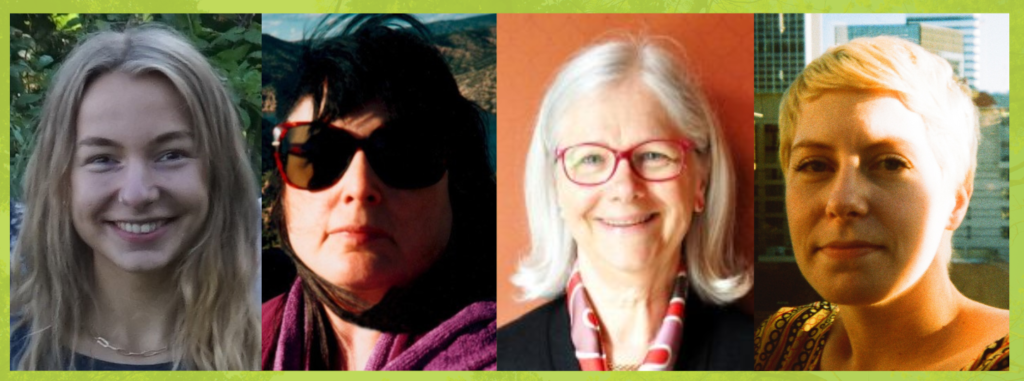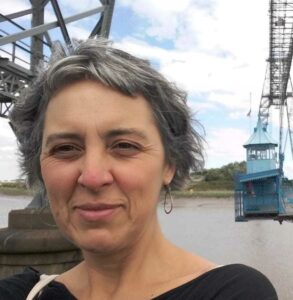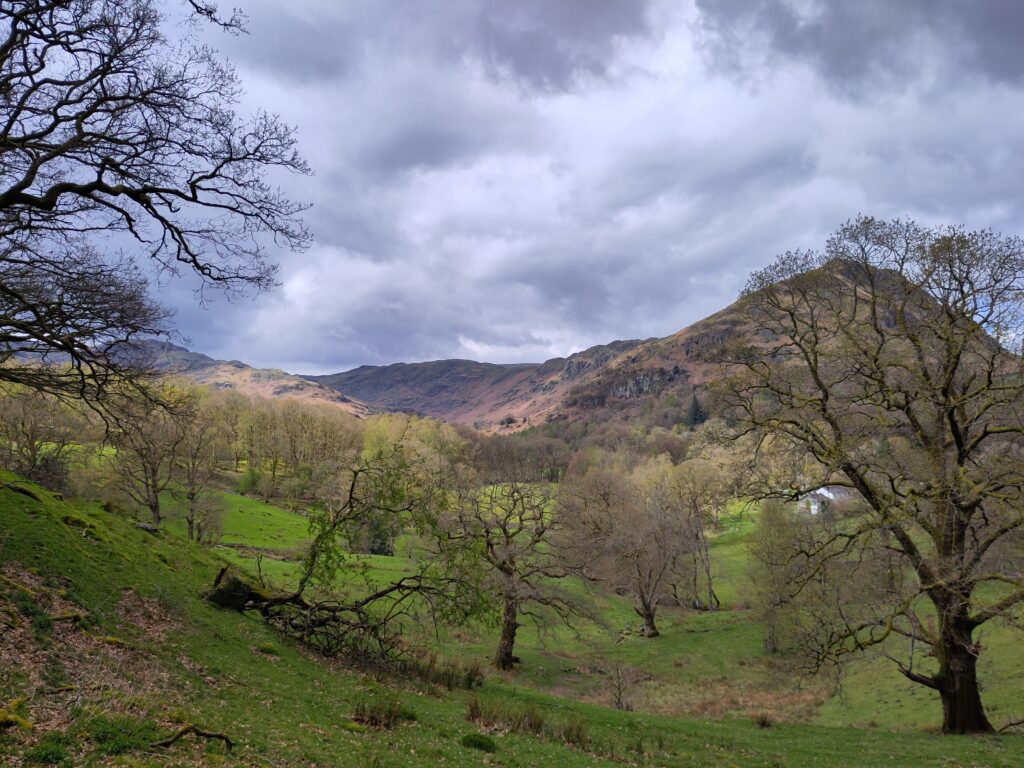The 2022 Eva Koch Scholars share their topic and why it’s important to Quakers today.

From left to right: Naomi Richards, Marguerite Kearns, Kate McNally, Kirstin Munro. Not pictured Ruth Kettle-Frisby & Meredith Freeman.
Naomi Richards
Naomi lives in Bristol and worship at Redlands Meeting.
What are you exploring in your Eva Koch scholarship?
The possibility of using the process of sharing food together to cultivate a sense of belonging, reverence and entanglement with(in) life on earth. This will include hosting and facilitating a series of meal-events with different groups (including Quakers) that would invite us to enter into conversation and community together to explore ways through climate collapse.
What made you want to pick this area?
I’m interested in the ways that food and sharing food meets us at the intersection between nature-culture, and the ways that eating together can create a container within which we can explore what it means to uphold ‘right-relationship’ between one another and the wider earth in an era of climate collapse. Sharing food is an ancient technology for cultivating relationships, and I am curious about how the forming and strengthening of relationships will support us as communities (Quaker and beyond) to be resilient and adaptable to what the coming epoch will hold. I wish to develop and refine practises and ways of inviting communities in to conversation about climate change and what it asks of us through invitations centred around food.
Marguerite Kearns
Marguerite is a teacher, journalist, and activist author, as well as a member of Plymouth Monthly Meeting in the Philadelphia, PA area. This is her childhood meeting where her grandmother and great grandparents are in the Quaker burial grounds there. She worships at Plymouth by way of zoom while remaining a resident of New Mexico. Her first book about Quaker family roots is: An Unfinished Revolution: Edna Buckman Kearns and the Struggle for Women’s Rights (2021, SUNY Press, State University of New York).
What are you exploring in your Eva Koch scholarship?
I am interested in individual and corporate leadings that include the Quaker peace testimony, climate change, anti-racism, as well as many other topics. I draw from my own experience, as well as researching and highlighting the personal experiences of others. Rather than rushing into action, I support slowing down first. I emphasize worship and discernment when defining and evaluating a proposed project. My emphasis is on spiritual discernment and how it is as important as moving forward on a leading with action.
What made you want to pick this area?
I have had limited insights into my own experience over the years. I haven’t always been clear about the intersection of secular and spiritually-based activism based on Quaker faith and practice. I wonder why the secular activism of a “good idea” may work well in the broader society, although its value may be questioned in a spiritual setting. A renewed interest in spiritual foundations has emerged in recent years leading to a questioning and spiritual emphasis on Quaker process in many world communities.
Kate McNally
Kate McNally is a member of Belgium and Luxembourg Yearly Meeting. A psychologist by training, she lives in Brussels where she works on issues of migration and anti-racism. In her spare time Kate judges international chocolate competitions and blogs at https://bravespaces.blog.
What are you exploring in your Eva Koch scholarship?
I will investigate the work that Friends are doing in the area of racial justice, suggest further action based on experience of other Friends, and possibly begin to form a network of Friends to work together to promote racial justice.
What made you want to pick this area?
In 2021, Britain Yearly Meeting agreed Minute 17, embracing a commitment to becoming an anti-racist YM. In 2022, minute 27 followed, raising the question of reparations. Steps have been taken at YM level to implement this commitment, and many meetings have begun this work. I plan to survey as many meetings as possible about the work that Friends are doing against racism, and write a report summarising this work, highlighting best practices and suggestions for meetings going forward.
I also hope to contact other European YMs to see if there are similar commitments, and where they exist will also survey local and area meetings. The results will be shared with Friends throughout Europe as a way to stimulate ideas and perhaps to form a network of those involved in anti-racism work. Possible other outcomes include putting Friends doing similar projects in contact with each other, and suggestions for concrete next steps for meetings at different places on the anti-racism journey.
Kirstin Munro
Kirstin Munro attends the Friends Meeting of San Antonio, Texas, and lives near the U.S.-Mexico border, where she is an Assistant Professor at the University of Texas Rio Grande Valley in a pluralist Political Science department. Her book, The Production of Everyday Life in Eco-conscious Households: Compromise, Conflict, Complicity will be published in March 2023 by Bristol University Press. In her free time, she is involved in the San Antonio-based advocacy team supported by the Friends Committee on National Legislation, learning American Sign Language, and is thrilled to have recently returned to ceramics after time away during the pandemic.
What are you exploring in your Eva Koch scholarship?
I will investigate the late 20th-century ecological concerns of members of the Historic Peace Churches in the United States (Religious Society of Friends, Mennonite Church, and Church of the Brethren). I hope that the insights and output from this project can help inform future work by Friends to address the climate crisis.
What made you want to pick this area?
This project grows out of a longstanding interest in the Historic Peace Churches and Christian Anarchism going back to my teenage years, an interest that was deepened thanks to my partner, who represents the fourth generation of an activist Quaker family. I’ve been struck in particular by something his great-grandfather, Henry E. Niles, said at the memorial for Norman Morrison following Morrison’s 1965 self-immolation to protest the U.S. war in Vietnam: “It is a Quaker tradition to follow the Inner Light and do what one truly believes is right for him to do even in the face of misunderstanding… Quakers… should devote their lives to challenging the immorality of the American Government.” How has this same sentiment been applied (or not) to our complicity in the existential crisis posed by climate change? I’m grateful for the support from Woodbrooke as I shift my research focus from secular environmentalism in eco-conscious households in the U.S. and U.K . to contemporary faith-based environmentalism in the Historic Peace Churches. I hope this project will provide some insights into the successes and failures of faith-based environmental activism that can help us understand potential paths forward for addressing the climate crisis—and which paths may be blocked.
Ruth Kettle-Frisby
Ruth’s backround is in teaching and externally examining A-Level Philosophy. She built a successful career as Subject Leader at a sixth form college in East London however left when it became clear that her children needed her full time. She is a mother-carer to my two young daughters, one of whom – due to CDKL5 (the neurodevelopmental condition that she lives with) – has to navigate her place in the world as a person with profound, complex disabilities (absolute superstar). She loves being a carer, and makes the most of my time with both children; by the same token, has an interest in self-care as it is especially important to keep her spirit in good shape.
What are you exploring in your Eva Koch scholarship?
My overarching question is: How can we in the Global North accompany and empower women and disabled people in the Global South from a uniquely faith-based perspective?
What made you want to pick this area?
For many of us, discovering injustice is – and ought to be, I think – an emotional experience: it can be frustrating, distressing, disorienting, and overwhelming. I wish to join intersectional feminist, anti-racist conversations in solidarity with women and disabled people on the front line of climate breakdown. I will be exploring the resonant notion of accompaniment as the basis for faith-based practice at such a critical time as this.
I believe that people of faith are well-placed to contribute positively to the framing of new, interconnected narratives about the climate crisis. I hope that my work will help to soften and heal the painful dichotomy between privileged and marginalised friends, and shed some light on what climate justice requires of us as Quakers.
Meredith Freeman
Meredith lives in Newport, South Wales. She wears a white body. She is an itinerant worshipper, a follower of trails and a Life Coach with an embodied approach. Perhaps she is a poet.

What are you exploring in your Eva Koch scholarship?
My working title is ‘No Justice, No Peace – A Call to Right Order’. My application had ‘Right’ in brackets.
What is justice? What is peace? What is right order? How do I know them? How might I live them? What happens when I embody them? What are brackets, come to that? These a few are my enquiries. My body is my compass and instrument of knowing.
My dawning awareness of my whiteness is very present. As is the creative work of allowing ourselves to be led. What if we were to live in felt relation to ourselves, to each other and to the planet?
What made you want to pick this area?
In 2020 a particular exercise during the Black Lives Matter, Whiteness and Racial Justice training run by Britain Yearly Meeting shook my foundations. My body’s response when I spoke the words ‘I am white’ changed me in a fundamental way. My view of myself in the world shifted. During the Newport Black Lives Matter march a month or two later, the tectonic plates of my Quaker foundation moved. No Justice, No Peace. Call and Response. Silence is Violence. Amplify Black Voices. What does this mean for me as a Quaker? What does it mean for Quakers?
I want to explore all this and to be seen, partnered with and joined. I want to live in Right Order; to live collectively in Right Order. Howard Thurman comes to mind as I type that. He says ‘There are two questions we have to ask ourselves. The first is ‘Where am I going?’ and the second is ‘Who will go with me?’’
I’m not sure I can truly say I wanted to pick this. The application almost wrote itself with the simultaneous discomfort and ease of ministry and now I find myself writing this; after much struggle, in a similar vein.



